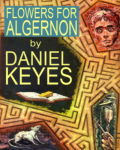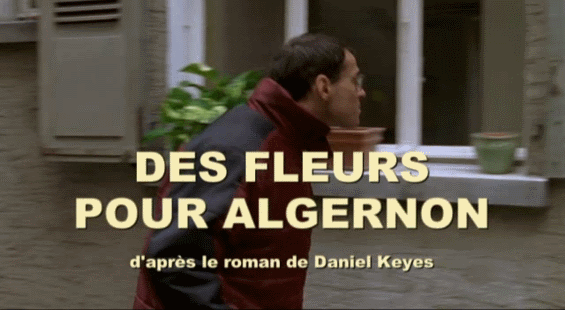

 Some stories adapt better than others. I think a straight narration of an audiobook of Daniel Keyes’ novelette of Flowers For Algernon would be an easy and natural way to experience most of the story’s power. Sadly, that’s still yet to happen.
Some stories adapt better than others. I think a straight narration of an audiobook of Daniel Keyes’ novelette of Flowers For Algernon would be an easy and natural way to experience most of the story’s power. Sadly, that’s still yet to happen.
The original story, of course, makes great use of spelling mistakes which could not fully be illustrated in any audiobook narration, but a straight single voiced reading of the story still provides the main thrust of the tale’s dramatic technique; we get the grammar of the main character, his account of what his doctors ask of him, and we get what his”friends” think of him.
The film and television versions that I’ve seen have, with video’s visually orientation, have all eliminated much of the very valuable power inherent in the epistolary.
Indeed, as editor James Gunn puts it in his introductory essay to Flowers For Algernon, found in The Road To Science Fiction #4 – From Here To Forever, “Part of the appeal of the story is the comparison of the reader’s knowledge to Charlie’s, and the ability to see more in Charlie’s reports than he knows is there.” Once you actually get out of Charlie’s head you lose his perspective and lose the unreliable narration.
So I was thinking about all of this as I was downloading a 1991 BBC Radio dramatization, via torrent, from RadioArchive.cc.
I was pretty skeptical of any radio dramatization’s ability to convey the story’s full power. Now though, after listening, I’ve come away convinced that it retains much of its power, and offers up a very innovative use of the aural medium. It is actually quite a tricky balance but it totally worked in the way it is put together.
Bert Coules, who adapted the novelette had this to say:
“In 1991 the BBC asked me to suggest some SF material for a short season. I drew them up a list and at the same time put in a claim to do Flowers, which I think is a tremendous story: it completed knocked me out when I first read it as a kid. I was delighted when I got the commission.”
In Flowers For Algernon the central character keeps a diary – in fact, the entire story consists of his diary entries. I changed the diary into a series of audio recordings made on a personal tape machine, and interspersed them with dramatised scenes which are mentioned or implied in Daniel Keyes’ original but which don’t actually appear in the story at all. When you’re writing new material like that, the challenge of course is to keep it consistent with the stuff that does come more or less straight from the book.
Flowers posed a particular problem: if you’ve read the story you’ll know that Charlie Gordon, the central character, goes through some huge changes which are brilliantly depicted by the way his diary entries are written: as he develops, so does his spelling, grammar and punctuation. I had to find a spoken way of reflecting the same journey.”
I believe he’s done a fantastic job with it.
Incidentally, the other plays in that series included: Brave New World, Kaleidoscope, The Midas Plague, The Chrysalids, Space Ache, Who Goes There? and Tiger! Tiger!.
So, like I was saying, if you haven’t read the original novelette, I recommend you experience the story that way, as a piece of text, first. If you have read it, then I heartily recommend you try the audio drama. It’s a wonderful adaptation with excellent acting and a highly innovative use of the microphone.
 Flowers For Algernon
Flowers For Algernon
Adapted from the novelette by Daniel Keyes; Dramatized by Bert Coules; Performed by a full cast
Approx. 59 Minutes [RADIO DRAMA]
Broadcaster: BBC Radio 4
Broadcast: September 5, 1991
Source: RadioArchive.cc
The play featured as part of a series of forward-looking productions collectively named “The shape of things to come.” Tom Courtenay stars as the intellectually challenged Charlie, who as part of an experiment is offered a “cure” for his low IQ…..First published in The Magazine Of Fantasy And Science Fiction’s April 1959 issue.
Cast:
Tom Courtenay ………………… Charlie
Algernon …………………….. Himself
Joanna Myers …………….. Miss Kinnian
Barrie Cookson …………….. Dr Strauss
Ronald Herdman ………………. Dr Nemur
Clarence Smith ………………….. Bert
Nigel Carrington …………. Joe/Donnegan
Auriol Smith ………….. Mrs Flynn/Ellen
Alan Barker …………. Frank/Sherrinford
Adapted by Bert Coules
Produced by Matthew Walters
Recorded Books produced an unabridged edition of the novelized expansion of the story:
 Flowers For Algernon
Flowers For Algernon
By Daniel Keyes; Read by Jeff Woodman
8 CDs – Approx. 9 Hours [UNABRIDGED]
Publisher: Recorded Books
Published: 1998
ISBN: 9781402550348
Charlie Gordon knows that he isn’t very bright. At 32, he mops floors in a bakery and earns just enough to get by. Three evenings a week, he studies at a center for mentally challenged adults. But all of this is about to change for Charlie. As part of a daring experiment, doctors are going to perform surgery on Charlie’s brain. They hope the operation and special medication will increase his intelligence, just as it has for the laboratory mouse, Algernon. Meanwhile, each day Charlie keeps a diary of what is happening to him. This is his poignant record of the startling changes in his mind and his life. Flowers for Algernon was first published as a short story, but soon received wide acclaim as it appeared in anthologies, as a television special, and as an award-winning motion picture, Charly. In its final, expanded form, this haunting story won the Nebula Award for the Best Novel of the Year. Through Jeff Woodman’s narration, it now becomes an unforgettable audio experience.
As mentioned earlier there have been four major video adaptations of Flowers For Algernon (three television movies and on theatrical film): Des Fleurs Pour Algernon (a 2006 French TV movie), Flowers For Algernon (a U.S. TV movie from 2000), Charly (a U.S. theatrical release from 1968) and a live broadcast teleplay that aired as a part of The United States Steel Hour in 1961 (it was titled The Two Worlds of Charlie Gordon).

And I’m afraid there was also a frightening looking musical theater version:
Posted by Jesse Willis





 1960:
1960: 1961:
1961: